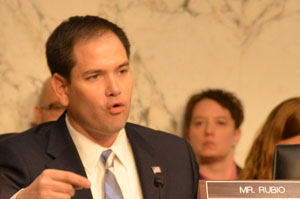Add Sen. Marco Rubio, R-Fla., to the list of lawmakers who wants to cut funding for the 2010 health care law as part of the debate over government funding for the remainder of the fiscal year.
In an interview with radio show host Hugh Hewitt, Rubio said he’ll support legislation to fund the government through Sept. 30 only if it contains language to defund the health law.
“This is going to be an implementation disaster. It’s going to hurt our economy severely, and we aren’t spending enough time talking about that,” Rubio said.
This week, the Senate is expected to consider – and amend — House-passed legislation that would fund the government through the end of the fiscal year. The bill did not include $949 million in additional funding that the Office of Management and Budget requested for the Centers for Medicare and Medicaid Services, which is overseeing much of the roll-out of the health law. The House measure keeps “sequestration” — the $85 billion in automatic budget cuts that began March 1 — in place. The bill would fund the government beyond March 27 when the current “continuing resolution” expires until the end of the fiscal year on Sept. 30.
While the OMB request did not specify what the $949 million would fund, “it was pretty well known” that the money was to be used to implement the health law’s exchanges, said Matt Dennis, a spokesman for Rep. Nita Lowey, D-N.Y., ranking member of the House Appropriations Committee. The exchanges are marketplaces being set up in each state where individuals and small businesses will be able to purchase insurance coverage. The exchanges are scheduled to begin enrolling individuals in October for coverage to begin Jan. 1.
Just after the House passed the measure March 6, Lowey said that “without IT infrastructure to process enrollments and payments, verify eligibility and establish call centers, health insurance for millions of Americans could be further delayed.”
Gary Cohen, who heads the CMS Center for Consumer Information and Insurance Oversight, nevertheless told reporters in a conference call March 7 that the health law’s exchanges would be up and running by Oct. 1 in all states.
But if Republican efforts to defund the health law are successful, all federal funding would cease. Sen. Ted Cruz, R-Texas, has said that he plans to offer an amendment on the floor that would delay funding of the 2010 health law. Cruz has also introduced legislation to repeal the law.
The health law “should not be implemented at [a] time when our economy is struggling so mightily, at a time when its implementation could push us into a full recession,” he said in a statement.
Like Cruz, Sen. Mike Lee, R-Utah, has said that he will object to Senate consideration of the continuing resolution unless the floor action includes a vote on defunding the health law.
“At this time of fiscal turmoil, Congress shouldn’t borrow more money to pay for something we cannot afford,” Lee said in a statement.
House Republicans have passed several measures to defund the health law and House Speaker John Boehner, R-Ohio, told reporters March 7 the House would do so again.
“We have voted several times to defund Obamacare,” Boehner said. “I am sure we will again this year.”







